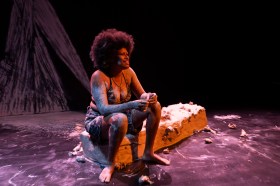From Harry Potter and the Order of the Phoenix. Image source: www.pepsiuniversity.blogspot.com
American school massacres such as the 2013 Sandy Hook tragedy, in which 27 people were killed, often trigger debates about the influence of harmful media on youth.
While concern is generally focused on video games, in 2011 the US Supreme Court declared that video games were no more harmful than other media, such as books.
Increasingly marketed towards adolescents, many books contain ‘edgy’ material including violence, sex, profanity, and other potentially objectionable content. In 2013, the American Library Association reported that these books are often challenged by parents, politicians or activists who seek to have them removed from public or school libraries.
In America, attempted book bannings include The Absolutely True Diary of a Part-Time Indian (violence), Harry Potter (occult themes), The Adventures of Huckleberry Finn (profanity), Thirteen Reasons Why (drug references) and Tango Makes Three (homosexual relationships).
In a study entitled Is Reading ‘Banned’ Books Associated With Behaviour Problems in Young Readers? The Influence of Controversial Young Adult Books on the Psychological Well-Being of Adolescents, Christopher J. Ferguson assessed the relationship between exposure to banned books and civic behaviors, externalising or internalising mental health problems, school-grade point average and violent and non-violent crimes.
Advocates of banned books argue that motivation stems from the need to ‘protect’ children from edgy material. However, proponents say that banning can be counterproductive, losing the opportunity for adults and children to discuss important issues which, in many cases, children will be exposed to anyway.
Ferguson reports how debates about banned books have been dominated by the ‘media effects theory’, until recently. In general, this theory claims that the consumption of objectionable media will result in social and behavioural problems.
Now new theories are emerging to contest the media effects theory. For instance, the ‘uses and gratifications theory’ suggests that individuals may select media based on preexisting personality traits and motivations. New studies show that media can be used purposefully to meet motivational needs left unmet in regular life, that adolescents can be active users and shapers of media and that media can be important in the identity development process of youth.
Focused around the lesser examined genre of books, Ferguson’s study included 282 South Texan youths, the majority of whom were Hispanic (96.8%) and female (61%).
To calibrate his results, the researcher combined a number of tests as ‘predictor materials’ including those which measured antisocial personality traits, degrees of family attachment and association with ‘delinquent peers’.
The young participants were asked whether they had read any of a list of 30 books identified by the American Library Association as a commonly challenged book over the past decade because of content, with a high percentage returning a positive result. Other questions included hours spent reading per week and hours spent reading books for fun.
Presented with such statements as ‘I worry about things’ and ‘I am easily annoyed’, participants were also tested for ‘neuroticism’ to assess the degree to which their personalities disposed them to negative moods.
In addition to ‘predictor materials’, the study compiled data on ‘outcome materials’ which measured the mental health of participants through a checklist filled out by youths’ primary caregivers, their frequency of civic involvement, so-called ‘delinquent behaviour’ ie criminal behavior and their grade point average.
Results
The study found that reading banned books was positively related to civic behavior, with civic behavior more common among older students.
For youth, reading of banned books was found to be specifically related to interests in politics and elections and involvement in charitable causes, but not volunteering in the community.
Gender was also found to be an issue with female participants with stronger family attachment, who spent more time reading for pleasure, found to have a greater grade point average than male students.
The reading of banned books did not correlate with either non-violent or violent crime commission. Non-violent crime commission was associated with delinquent peers while violent crime was predicted by antisocial personality only.
The relationship between neurotic symptoms and reading banned books only held for girls but not for boys.
The results indicated that banned books were either positive or neutral on most outcomes related to civic behaviours, grade point average and criminal behaviour. However, the attraction to banned books was also found to be positively correlated with mental health symptoms, both externalizing aggressive behaviours and internalizing neurotic ones.
Ferguson concluded that reading challenging books in youth can increase compassion, promote ethical development and foster high-level thinking.





